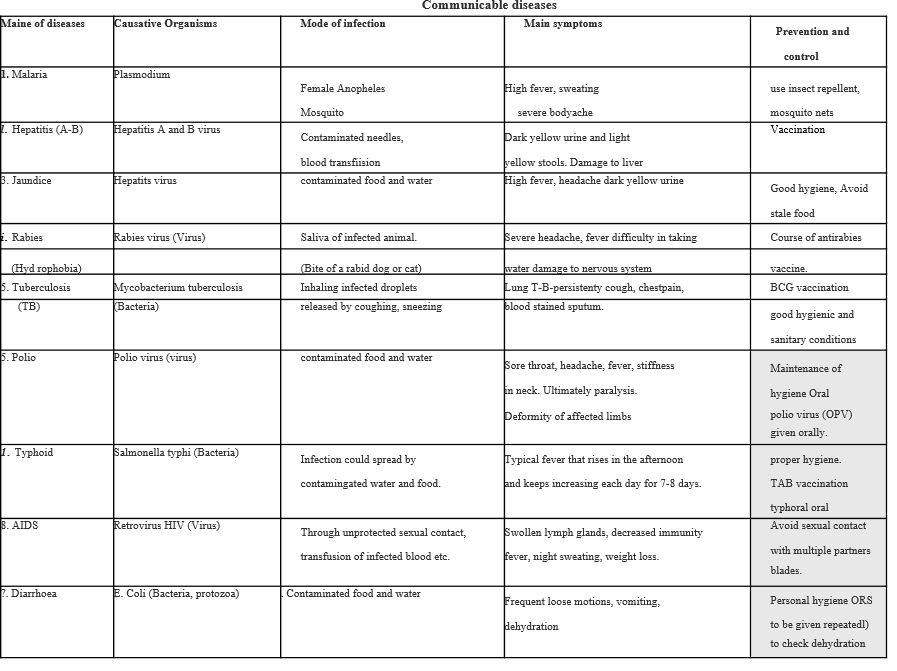Why Do We Fall Ill KSEEB Class 9 Chapter 13 Important Concepts
Health and diseases, infectious and non-infectious disease, the disease caused by microbes and their prevention principles of treatment and principles of prevention
Health: A state of complete physical, mental and social well-being, and not merely an absence of disease, or infirmity-WHO
Disease: Any physical or functional change from the normal state that causes discomfort or impairs the health of the living organism.
Acute diseases: The diseases which last for only very short periods of time.
Chronic diseases: The diseases last for long time, even as much as a lifetime.
Example: AIDS
Causes of diseases: Infection by microorganisms, malfunctioning of body organs, deficiency of one or more nutrients, genetic factors, polluted environment.
Infectious disease: The disease which are caused immediately because of microbes are called infectious diseases.
Example: Dengue fever.
Non-infectious disease: The disease that are not caused by infectious agents like microbes and which do not spread in the community are called non-infectious diseases.
Example: Cancers.
Read and Learn More KSEEB Solutions for Class 9 Science
| Class 9 Social Science | Class 9 Science | Class 9 Maths |

Infectious agents: Organisms that can cause disease are found in a wide range of categories of classification some of them are viruses, Bacteria, Fungi, protozoans, helminths etc.
Spread of infectious diseases: Infectious diseases spread through Air – common cold, Tuberculosis Water – Cholera Sexual contact – AIDS, syphilis
Vectors: Vectors are the intermediaries which carry the infectious agents from a sick person to another potential host.
Example: Insects (Mosquitoes)
KSEEB Solutions for Class 9 Science Chapter 13 Why Do We Fall Ill
Communicable diseases: These diseases are caused by pathogens or infectious agents such as bacteria viruses, fungi, protons, worms etc. These diseases can spread from a diseased or affected person to a healthy person by means of air, water, food, insects, physical contact etc.,
Antibiotics: They are chemical substances produced by living organisms such a bacteria and fungi, which can kill or stop the growth of some pathogenic microorganisms.
Vaccine: It is a suspension of disease-producing microorganisms which is modified by killing so that the suspension will not cause disease but on entering the body initiates the immune system to produce antibodies against a particular disease.
Vaccination: It is the inoculation of a vaccine in the body of a healthy person in order to develop immunity against a particular disease.
Immunisation: It is the production of immunity in an individual by artificial means.
Common Vaccines: DPT, BCG, Polio vaccine, Typhoid Vaccine, Measles Vaccine, TT Vaccine, Hepatitis etc.,
Diseases caused by microbes: Protozoa – Malaria Viruses – Hepatitis, AIDS, Rabies, Polio, Herpes, Polio Bacteria – Tuberculosis, Typhoid, Diarrhoea

Why Dowe Fall Ill Exercises
Question 1. How many times did you fall ill in the last one year? What was the illness?
1)Think of one change you could make in your habits in order to avoid any of / most of the above illnesses?
2)Think of one change you would wish for in your surroundings in order to avoid any of / most of the above illnesses.
Answer:
I fell ill twice in the last year. The first time suffered from diarrhoea and at the second time suffered from viral fever.
1. Washing hands before meals and remaining away from people suffering from viral fever.
2. Drinking pure water, planting more trees and disposal of garbage.
Karnataka Board Class 9 Science Chapter 13 Why Do We Fall Ill Solutions PDF
Question 2. A doctor/nurse/health – worker is exposed to more sick people than others in the community. Find out how she/he avoids getting sick herself/himself.
Answer:
A doctor/nurse/health worker should take the following precautions.
1. Washing hands with soap thoroughly after serious examination of patients.
2. Keeping a place of work sterilized by using phenyl etc.
3. takes balanced food to develop a powerful immune system.
4. proper disposal of blood samples urine, and sputum.
Question 3. Conduct a survey in your neighbourhood to find out what the three most common diseases are and suggest three steps that could be taken by your local authorities to bring down the incidence of these diseases.
Answer: The three most common diseases in my neighbourhood are.
1. Hepatitis
2. Cold and cough
3. Diarrhoea
The three steps that should be taken by local authorities are.
1. Arranging immunisation programmes
2. Providing clean drinking water
3. Providing better sanitation.
Question 4. A baby is not able to tell her/his caretakers that she/he is sick. What would help us to find out
1)that the baby is sick?
2)What is the sickness?
Answer:
The following symptoms will help us to find out that the baby is sick are,
1. Continuous crying.
2. High body temperature
3. Improper intake of food,
4. Loose motions.
Question 5. Under which of the following conditions is a person most likely to fall sick?
1)When she is recovering from malaria.
2)When she has recovered from malaria and is taking care of someone suffering from chickenpox.
3)When she is on a four-day fast after recovering from malaria and is taking care of someone suffering from chickenpox why?
Answer: A person is most likely to sick when she is on a four-day fast after recovering from malaria and is taking care of someone suffering from chicken pox because when she is on fasting, her body may weak due to insufficient food. So, she is more prone to infections. If she is taking core of someone suffering from chicken pox, then it is more likely that she may also get the disease.
Question 6. Under which of the following conditions are you most likely to fall sick?
1)When you are taking examinations.
2)When you have travelled by bus and train for two days.
3)When your friend is suffering from measles. Why?
Answer: We are most likely to fall sick when we are near to our friend who is suffering from measles. It is so because measles is an infectious disease.
Why Dowe Fall Ill Textual Questions
Question 1. State any two conditions essential for good health.
Answer: The conditions essential for good health are
1)Clean surroundings.
2)Adequate and nutritious food
Question 2. State any two conditions essential for being free of disease.
Answer:
1)Living in a hygienic environment
2)Getting vaccinated against common infectious diseases.
Question 3. Are the answers to the above questions necessarily the same or different? Why?
Answer: Answers to the above questions are interconnected but different. It is so because being disease-free does not mean one is healthy.
KSEEB Class 9 Science Chapter 13 Why Do We Fall Ill Notes
Question 4. List any three reasons why you would think that you are sick and ought to see a doctor. If only one of these symptoms were present. Would you still go to the doctor? Why or why not?
Answer:
The three reasons of feeling sick and ought to see a doctor are,
1)Having a fever (body temperature)
2)Having a cold and cough
3)Having diarrhoea.
These symptoms indicate that there may be a disease, so I would have gone to consult the doctor.
Question 5. In which of the following case do you think the long-term effects on your health are likely to be most unpleasant?
- If you get jaundiced,
- If you get lice,
- If you get acne. Why?
Answer: Lice and acne can be removed easily with short treatment, both these do not produce long-term effects on the body. Jaundice will have a drastic long-term effect.
Question 6. Why are we normally advised to take nourishing food when we are sick?
Answer: When a person is sick, then his normal body functions get disturbed. In such a situation, food is required which is easy to digest and contains adequate nutrients for recovery, thus nourishing food is required during sickness.
Question 7. What are the different means by which infectious diseases are spread?
Answer:
Infectious diseases are generally spread through,
1)Air
2)Water
3)Sexual contact
4)Physical contact with the infected person
5)Vectors
Question 8. What precautions can you take in your school to reduce the incidence of infectious diseases?
Answer:
The following precautions can be taken in the school to reduce the incidence of infectious diseases;
1)Clean surroundings.
2)Educating students about the causes of infectious diseases.
3)Immunisation.
4)Isolating the affected students to not attend classes till they recover from infectious diseases.
Question 9. What is immunisation?
Answer:
Immunisation is a technique in which people are given a particular vaccine so that they develop temporary or permanent immunity against a particular infectious disease.
Class 9 Science Chapter 13 Why Do We Fall Ill Important Questions Karnataka Board
Question 10. What are the immunisation programmes available at the nearest health centre in your locality? Which of these diseases are the major health problems in your area?
Answer:
The following are the immunisation programmes available at the nearest health centre in our locality.
1) Polio
2) DPT
3)Measles
4)MMR
5)Smallpox
6)TT
7)Hepatitis B.
Why Dowe Fall Ill Additional Questions
Question 1. What is an antibiotic? Give two examples.
Answer: Antibiotic is a chemical secreted by microorganisms (bacteria and fungi) tliat kills the growth of some kinds of germs.
Examples: penicillin and streptomycin.
Question 2. Name any three diseases transmitted through vectors.
Answer: Malaria, typhoid, and plague.
Question 3. List some preventive measures against communicable diseases.
Answer:
1)Health Education
2)Isolation
3)Proper sanitation
4)Immunisation
Question 4. Distinguish between acute and chronic diseases.
Answer: Acute diseases last for short period and cause major effects on general health ina very short time. Chronic diseases lasts for long period, it takes a long time to have major effects on general health.
Question 5. Define health.
Answer: Health is described as the state of complete physical mental and social well-being, and not merely an absence of disease.
Question 6. What are contagious diseases? Give one example.
Answer: The diseases which are spread by actual contact between an infected person and healthy persons are called contagious diseases. Eg. Chickenpox.
Why Dowe Fall Ill High Order Thinking Questions
Question 1. Why do parents immunize their newborn babies?
Answer:
The parents immunise the newborn baby because.
1) To provide immunisation to a specific diseases.
2) To protect children from deadly diseases.
Question 2. Reema is suffering from cholera. It is likely that the children sitting around her will be exposed to the infection.
1) Do all the students get infected and suffer from disease?
2) List any two major symptoms of cholera.
Answer:
1. No, all students will not get infected and suffer from the disease because a large inoculum is required to transmit the disease.
2. Symptoms of cholera are.
- Rapid heartbeat
- Low blood pressure.
Question 3. Why are antibiotics not effective for viral disease?
Answer: Antibiotics generally block the biosynthetic pathways and they block the pathways of bacteria or microbes. However, viruses have very few biochemical mechanisms of their own and hence are unaffected by antibiotics
Question 4. Why did female Anopheles mosquito feed on human blood?
Answer: FemaleAnopheles mosquito feeds on blood because it requires proteins of human blood to lay eggs.
Karnataka State Board 9th Science Why Do We Fall Ill Exercise Solutions
Question 5. What is meant by ‘symptoms’ of a disease? What do they indicate?
Answer: These are manifestations or evidence of the presence of diseases. These indicate that there is some abnormality in the body.
Why Dowe Fall Ill Unit Test
Question 1. Repeated exposure to a pathogen leads to
the development of ______
1) disease
2) immunity
3) Cancer
4) weakness
Answer: (2) immunity
Question 2. A child who has had an infection of chicken pox does not suffer from the disease for the second time, because_____
1) The body has developed immense strength to fight the infection.
2) The immune system keeps a memory of the specific disease and responds by killing the infectious agent, in the second exposure.
3) The boy is advised to take vitamin tablets daily after the disease
4)The child is given clean and nutritious food after the disease.
Answer: (2) The immune system keeps a memory of the specific disease and responds by killing the infectious agent, in the second exposure.
Question 3. Which one of the following diseases is not transmitted by mosquitoes?
1)Brain fever
2)Malaria
3)Typhoid
4)Dengue
Answer: (3) Typhoid
Why Dowe Fall Ill Fill In The Blanks
1.The full form of BCG Bacillus calmette and Guerin.
2. Mosquito is the vector of Dengue and Malaria.
Why Dowe Fall Ill Answer the following Questions
One Mark
Question 1. Name two diseases that spread through water.
Answer: Cholera, amoebic dysentery.
Question 2. Name two vaccines given to children below 5 years of age.
Answer:
1. Polio Vaccine
2. Hepatitis
Question 3. After eating contaminated food, a number of people complained of nausea, vomiting, abdominal pain and loose stools.
1)Name the disease they are suffering from
2)Name the causative organism.
Answer:
1) Diarrhoea
2)Escherichia coli or salmonella
Class 9 Science Chapter 13 Why Do We Fall Ill Summary KSEEB
Question 4. Name any two diseases against which vaccinations are available.
Answer:
1)Tuberculosis
2)Typhoid
Question 5. What do the physicians do on the basis of symptoms?
Answer: Physicians look for the signs of a particular disease.
Question 6. What are pathogens?
Answer: Disease-causing microorganisms are called pathogens.
Two Marks
Question 1. Differentiate between congenital diseases and acquired diseases.
Answer:
Congenital diseases are anatomical or physiological abnormalities present since birth.
Example: Haemophilia, colourblindness
Acquired diseases are those that develop after birth.
Example: AIDS.
Question 2. What is the difference between a virus and a bacteria?
Answer:
Viruses
1. Non-cellular
2. Have no metabolism of their own
3. Command the host cell to produce a virus.
4. can be crystallised
Bacteria
1. Single-celled
2. Have a metabolism of their own
3. They can reproduce by their own.
4. cannot be crystallised
Question 3. Give two examples for each of the following.
1)Infectious diseases
2)non-infectious diseases
3)Acute diseases
4)Chronic diseases
Answer:
1) Infectious diseases— Smallpox, chicken pox
2)Non-infectious diseases— Diabetes, simple Goitre
3)Acute diseases — Viral fever, flu
4)Chronic diseases—Tuberculosis, Elephantiasis
Question 4. List the following diseases into communicable and non-communicable diseases.
Answer:
- Cancer: Non-Communicable
- High blood pressure: Non-Communicable
- Common cold: Communicable
- Diabetes: Non-Communicable
- Tuberculosis: Communicable
- Night blindness: Non-Communicable
- SARS: Communicable
- Typhoid: Communicable
- Cholera: Communicable
- Dengue: Communicable
Why Do We Fall Ill Chapter 13 Class 9 KSEEB Textbook Solutions Free PDF
Question 5. What are the modes of HIV transmission?
Answer:
1)Unprotected sexual contact with an infected partner.
2)Use of contaminated needles and syringes.
3)Transfusion of infected blood.
4)Mother to baby due to rupturing of blood vessels at the time of birth.
KSEEB Class 9 Science Why Do We Fall Ill Extra Questions with Answers
Why Dowe Fall Ill Activity
Question 1. Conduct a survey in your locality. Talk to 10 families who are well-off and ten who are very poor (in your estimation) Both sets of families should have children who are below five years of age. Measure the heights of these children. Draw a graph of the height of each child against its age for both sets of families.
1) Is there a difference between the groups? If yes, why?
2) If there is no difference, do you think that your findings mean that well-off or poor does not matter for health?
Conclusion:
After conducting the survey and preparing the graphs of the height of each child against his age, you would find that there is a difference in the heights of children of two groups Children of rich families have better growth than children of very poor families. It is so because children of well-off families take adequate balanced diets, live in clean environments and better conditions of living than children of very poor families
